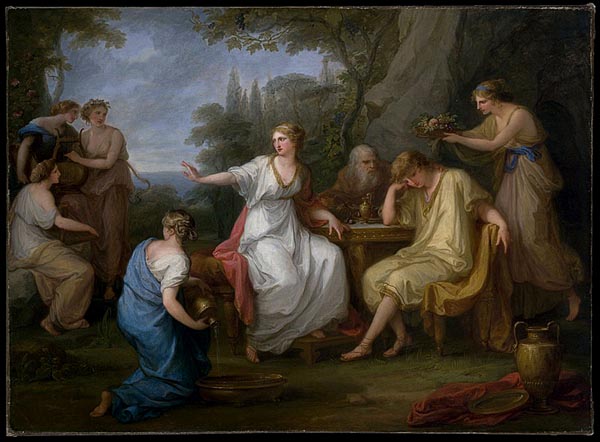 |
| Telemachus mopes about his dad being away (Wikipedia) |
Note: Homer's second great work, The Odyssey, tells of the wanderings of one leader, Odysseus, on his way home from the Trojan War.
Get Ready: Do you have (or have you ever had) a mentor? What role does/did she or he play in your life?
Let's continue our look at the Great Books with Homer's second great epic, The Odyssey.
The title itself is used as a common noun (as opposed to a proper noun) to describe a long trip or adventure, whether actual or metaphorical. We can talk about a child entering school as beginning his "odyssey of learning," for example.
Homer's story tells of the wanderings of a warrior name Odysseus (the namesake of the book) on his way home from the Trojan War. Along the way he meets many characters, and the names of some of them have become well-known allusions in English.
What is an allusion? It's a passing reference to some bit of knowledge that's not fully spelled out. If I said, "It's hotter than Hades!" many of you would know that I was referring to another name for Hell; I wouldn't need to actually explain what I was talking about.
Today we'll look at three allusions from Odysseus's travels: Mentor, Proteus, and Calypso.
Odysseus wandered for ten long years. Add the ten years of the war, and you can imagine how his family must have missed him. His son Telemachus was just a baby when Odysseus left, and Odysseus asked an old friend to see after the boy's well-being. Nearing age twenty, Telemachus decided to set off in search of his father. Athena, the goddess of wisdom, disguised herself as that old family friend and guided Telemachus on his journey. The friend's name was Mentor.
And so "mentor" has come to mean an older, more experienced person who shares his or her wisdom with a younger one. We often use this term in academics and business, but few people realize it is an allusion to a character in The Odyssey.
Proteus is a minor character in The Odyssey. Homer calls him the "Old Man of the Sea," as he was one of the early sea gods (before Poseidon). He is a shapeshifter--able to change forms at will--and this gives us the adjective "protean," which means "versatile" or "able to assume many forms." It can even refer to a word whose meaning changes in different situations.
Next is Calypso. This sea nymph entertained Odysseus after his ship was wrecked and he washed up on her island. She fell in love with him and tried to keep him (he stayed seven years!) but his love for his wife and home was too strong, so Calypso sent him on his way. She has lent her name to a 20th-century style of music and dance from the Caribbean islands. "Calypso" was also the name of sea explorer Jacques Cousteau's research ship.
In Lesson #01-211 we'll look at two more allusions, the Sirens and "Scylla and Charybdis," as well as some back story to The Iliad that we skipped over in Lesson #01-208.
--------Read more: https://en.wikipedia.org/wiki/Odyssey
Practice: Match the term to its definition below:
- disguised
- explorer
- metaphorical
- namesake
- proper noun
- shapeshifter
- spelled out
- versatile
- wandered
- well-being
- traveled aimlessly, without a destination
- able to do many things well
- a person who travels to learn new things
- health, happiness, etc.
- an imaginary being that can change from one form to another
- two people (etc.) having the same name
- wearing a costume or otherwise hiding one's identity
- explained; made clear
- symbolic; not literally true
- one which names a specific person, place, thing, or idea, like "Jim Bucket" or "The Philippines"
Answers are in the first comment below.
Submitted to the Shenzhen Daily for January 15, 2009


Answers to the Practice: 1. g; 2. c; 3. i; 4. f; 5. j; 6. e; 7. h; 8. b; 9. a; 10. d
ReplyDelete